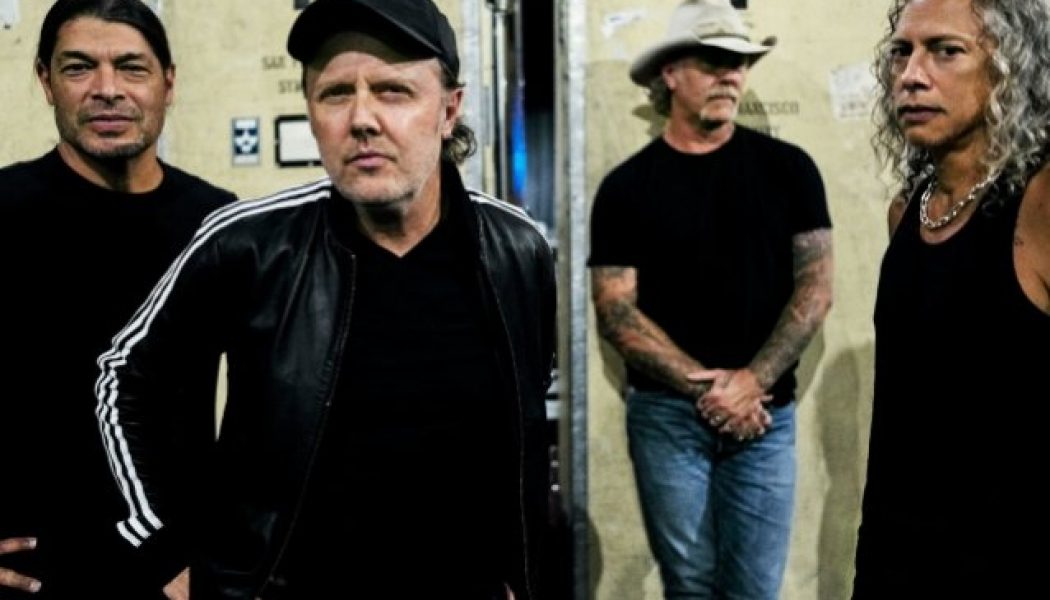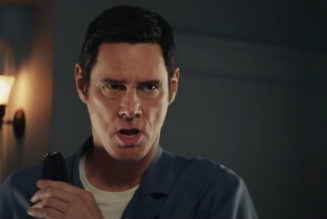METALLICA drummer Lars Ulrich has opened up about what it was like seeing James Hetfield re-enter a treatment program to work on his recovery from alcohol addiction. The METALLICA frontman went back to rehab in September 2019, forcing the postponement of the band’s tour of Australia and New Zealand. In a new interview with METALLICA‘s So What! fan-club magazine, Ulrich discussed Hetfield‘s addiction issues and how it affected the rest of the group. “[Back in September 2019], two [or] three days out from [having done] ‘S&M²’, I was told that James had some issues, and that he had to go and deal with that, and nobody at that time really knows what that means,” Lars said. “You know, what does it mean for him, what does it mean for us, what does it mean for scheduling, all that shit. You just kind of sit there, and obviously your first thoughts are, is he okay? What’s going on? Then the Australian dates got moved. Then there was the ‘Helping Hands’ concert that got moved, so on and so forth. And you start understanding more. “We spoke a couple times,” he continued. “We were texting. Started getting some more clarity, I mean, we’re coming up on 40 years here. You surrender to the elements. It’s part of the ride, and, obviously, none of us are officially married to each other, but you know, in marriage vows you say ‘in the good times and the bad times, in health and in sickness, in ups and then downs,’ and if there’s anything that’s clear almost 40 years later, it is that we’re in this for the long haul. We love each other, we believe in each other. We have each other’s backs. We will fight for each other. And we sort of roll with it. “I’m not gonna bullshit you, if I look back to a year ago, there were days where I was more positive, there were days where I was less positive, and there were days where you sit and wonder, ‘How is this going to play out?’ And Kirk [Hammett], Rob [Trujillo] and I were probably talking and communicating closer and more intimately than ever before. This shit is never easy, but it’s also part of the ride, and so you just learn. “We’re different people from each other,” Lars explained. “We’re independent people from each other. We live our own lives, and METALLICA‘s the thing that connects us. And so like in any next level, strong, binding relationship, there are parallel paths, which are the state of the collective — the group — and the state of the individuals. So it’s like, ‘How is James, how is Lars, how is Kirk, how is Rob?’ That’s one conversation. And then, ‘How is METALLICA?’ which is a different conversation, and what gets tricky is that both of those conversations exist on parallel trajectories, but also overlap more often than not. “When you were 19 years old, maybe there was a greater emphasis on the collective or on the gang mentality, and when you’re 156 years old, like I am now, maybe the percentages shift. There’s a significant emphasis on your family, yourself, and the trajectory you’ve created for yourself outside of METALLICA, so it’s an interesting place where all that kind of comes to a head and you have to prepare yourself for the ups and downs. “I don’t know what Kirk told you [in his So What! interview], I don’t know what Rob told you, I didn’t read James‘s interview. It’s hard for me to imagine that everybody was not feeling sort of the same thing, which was first and foremost, ‘How is James? Is he okay? Will he be okay? Will he find the tools, and will he find what he needs on the path of his recovery?’ And then at the same time, ‘How am I feeling about this? How is the band feeling about this?’ and all that kind of stuff. “But a year later, here we are, all engaged. James is in a very healthy place, the band is in a very healthy place, and obviously COVID has played a major role in all of it,” Ulrich added. “It’s been a mindfuck of a year; I’m sitting here on October 16th, I feel confident and excited about the state of the METALLICA nation, and I feel very optimistic about what’s ahead.” Lars went on to say that there is now “more clarity” on METALLICA‘s path forward. He explained: “In order for this band to function, the band members have to function, families have to function, and personal lives have to be in order. METALLICA lives have to be in order. So there’s all these sorts of relationships, people, and dynamics to work with. As we move forward and the earth rotates through the universe, I think we continuously get a little more clarity on the path forward in terms of the balances needed to keep everything rolling, to keep the band functioning, to keep the band members happy, to keep the lights on — all those different things. I think we’re better at it now than we were ten years ago, ten years ago we were better at it than we were ten years before. So it’s all just part of the path forward. “Obviously, you understand that if you are in a group, if you are in a collective setting, there are pros and cons to that,” he continued. “There’s four members, and if one of those four guys goes down for whatever reason, and I don’t want to sound clinical about this, then we deal with it to the best of our ability, and with the resources and the knowledge that we have. I feel that every time somebody goes down, we learn from that and so the next time we deal with it better.” In a 2003 interview with Kerrang! magazine, Hetfield spoke about his battle with alcohol addiction and the much-publicized trip to rehab in 2001 that had seemingly enabled the singer to emerge a much healthier and more positive-thinking person that he was during much of the group’s 35-plus-year career. “Going away to rehab taught me about priorities,” he said. “I’ve been in METALLICA since I was 19 years old, which can be a very unusual environment, and it’s very easy to find yourself not knowing how to live outside of that environment, which is what happened to me. I didn’t know anything about life. I didn’t know that I could come home and live a family life. I didn’t know that I could live my life in a different way to how it was in the band since I was 19, which was very excessive and very intense. And if you have addictive behavior, then you don’t always make the best choices for yourself. And I definitely didn’t make the best choices for myself. “But rehab is like college for your head,” he continued. “I really learned some things about myself in there. I was able to reframe my life and not look at everything with a negative connotation. That’s how I was raised. It was like a survival technique for me. And getting into METALLICA meant that initially I had to fight to survive, for food, for the towel, for the shower, for everything. And then fighting to be the best band you can be, and putting other bands down. Finding fault with everything was how METALLICA was fueled. And not only did I play a part in that, I was buried in that.” “[In rehab] I learned that every human being is born perfect. I learned that the flaws in ourselves comes from the things around us, from our backgrounds and influences. But when we’re born, we all have the same-sized soul. There are certain things that are genetic, but that doesn’t mean that I have to act in a certain way, and I didn’t know that. My lifestyle has been very intense, and I didn’t know how to remove myself from that. Rehab taught me how to do that. It basically taught me how to live.” “I was afraid of so many things. I’d look at other people’s friendships and think, ‘Man, why can’t I have friendships like that?’ But I didn’t know how to. So I used to try and buy friendships.” Asked whether it was difficult to say to himself, “Look, things have gone too far for me, I need to reach out for help,” James said: “Yes, it definitely was difficult. That was one of the most difficult things of all. I had no humility and I felt that I couldn’t show any weakness. For me, I was James Hetfield of METALLICA rather than just James Hetfield. And I was trying to live that lifestyle at home, I was trying to wear that mask all the time. And it’s amazing how long you can wear a mask for. We’re performers who play music — I mean, this is us. This isn’t an act. But now I’ve learned how to be more congruent with where I am. Admitting that sometimes being on tour really sucks, and that I would rather go home. Or that I’m not in a good mood right now, and not worrying if people turn around and say, ‘Hey, you’re an asshole.’ That can’t hurt me now, whereas I used to be so concerned that people liked me. “There’s a lot of machoism in this world, but I suppose the most manly thing you can do is face up to your weaknesses and expose them. And you’re showing strength by exposing your weaknesses to people. And that opens up a dialogue, it opens up friendships, which is definitely what it has done for me.” During a 2017 interview with “The Joe Rogan Experience” podcast, Hetfield spoke in more detail about checking into rehab 17 years ago and how he almost lost his family in the process. “Fear was a big motivator in that for me,” Hetfield said. “Losing my family, that was the thing that scared me so much. That was the bottom I hit, that my family is going to go away because of my behaviors that I brought home from the road. I got kicked out of my house by my wife; I was living on my own somewhere. I did not want that. Maybe as part of my upbringing, my family kind of disintegrated when I was a kid. Father left, mother passed away, had to live with my brother, and then kind of just, where did my stuff go? It just kind of floated away, and I do not want that happening. No matter what’s going on, we’re going to talk this stuff out and make it work.” He continued: “[My wife] did the right thing — she kicked my ass right out of the house and that scared the shit out of me. She said, ‘Hey, you’re not just going to the therapist now and talking about this. You’ve got to go somewhere and sort this shit out.’ So that’s what I did… What worked for me was seven weeks someplace — like, basically tearing you down to bones, ripping your life apart. Anything you thought about yourself or what it was, anything you thought you had, your family, your career, anything, gone. Strip you down to just — you’re born. Here’s how you were when you were born — you were okay. You were a good person. Let’s get back to that again. Then they slowly rebuild you.” Hetfield‘s issues with addiction and alcoholism were detailed in the 2004 documentary “Some Kind Of Monster”.
LARS ULRICH Opens Up About JAMES HETFIELD’s Return To Rehab, Says METALLICA Is ‘In A Very Healthy Place’ Right Now










